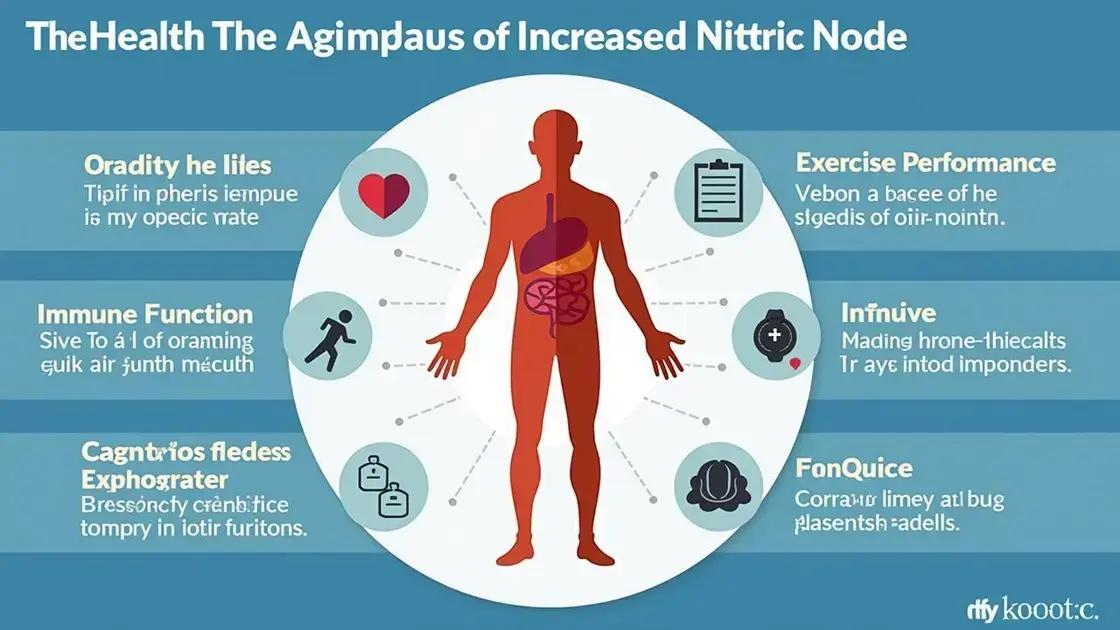The connection between mango and enhanced nitric oxide levels is significant, as mangoes are rich in vitamins, polyphenols, and arginine that support nitric oxide production, leading to improved cardiovascular health, better exercise performance, and overall wellness.
The connection between mango and enhanced nitric oxide levels is a fascinating topic that blends nutrition and health benefits. Nitric oxide plays a crucial role in cardiovascular health, helping to improve circulation and lower blood pressure. Interestingly, mangoes are emerging as a superfood that may boost nitric oxide levels. In this article, we will delve into the nutritional profile of mango, explore how it contributes to increased nitric oxide production, and provide practical tips for incorporating mango into your diet.
Understanding Nitric Oxide

Nitric oxide (NO) is a vital molecule in the human body, playing essential roles in numerous physiological processes. It is a gas that is produced naturally by the body and is involved in vasodilation, which is the widening of blood vessels. This process enhances blood flow and lowers blood pressure, contributing to overall cardiovascular health.
NO is generated from the amino acid arginine through a reaction facilitated by the enzyme nitric oxide synthase. The production and use of nitric oxide in the body are crucial for maintaining healthy blood circulation, as it allows for the proper distribution of oxygen and nutrients to cells and organs.
Furthermore, nitric oxide plays a role in the immune system, aiding in the defense against pathogens by modulating the activity of immune cells. It also assists in neurotransmission, where it acts as a signaling molecule in the nervous system.
The significance of nitric oxide extends beyond cardiovascular health. It addresses various health issues, such as erectile dysfunction, where enhanced NO levels can improve sexual function by increasing blood flow.
By understanding nitric oxide’s multifaceted roles, we can appreciate why enhancing its levels through dietary means, such as consuming mangoes, can lead to improved health outcomes.
Nutritional Profile of Mango

Mangoes are not just delicious; they are packed with a variety of nutrients essential for good health. A typical serving of mango, which is about one cup (about 200 grams), provides the following key nutrients:
- Calories: Approximately 150 calories
- Carbohydrates: 35 grams, primarily from natural sugars
- Dietary Fiber: About 5 grams, aiding digestion
- Vitamins: Rich in vitamin C (over 60% of daily value), vitamin A, and vitamin E
- Minerals: Contains potassium and magnesium
The high content of vitamin C not only supports the immune system but also plays a role in enhancing nitric oxide production in the body. Vitamin A is crucial for vision and skin health.
Mangoes also contain various phytonutrients and antioxidants, including beta-carotene, which helps protect cells from damage and supports overall health. These nutrients work together to promote healthy circulation and may even enhance the body’s ability to produce nitric oxide.
Additionally, the natural sugars in mangoes provide a quick source of energy, making them a perfect snack for those seeking an energy boost. Overall, the nutritional profile of mangoes supports various bodily functions, making them a worthwhile addition to a balanced diet.
Health Benefits of Increased Nitric Oxide

Increasing nitric oxide levels in the body offers several significant health benefits that contribute to overall well-being. One of the primary advantages is improved cardiovascular health. Nitric oxide helps relax and widen blood vessels, resulting in better blood flow. This can lower blood pressure and reduce the risk of heart disease.
Another important benefit is enhanced exercise performance. Higher levels of nitric oxide can improve stamina and endurance. Athletes often use nitric oxide boosters to enhance their performance during workouts. This increased blood flow means more oxygen and nutrients reach the muscles, allowing for better exercise efficiency.
Nitric oxide is also essential for immune function. It plays a part in the body’s defense against infections by helping to regulate inflammation. Proper regulation of inflammation is crucial for preventing chronic diseases.
Additionally, higher nitric oxide levels can reduce the risk of erectile dysfunction. By improving blood circulation, it can enhance sexual performance. Improved circulation is vital for various bodily functions, making nitric oxide an essential factor in sexual health.
Moreover, nitric oxide contributes to better cognitive function. It improves blood flow to the brain, which can enhance memory and learning capabilities. Maintaining healthy nitric oxide levels supports mental clarity and focus.
How Mango Enhances Nitric Oxide Production

Mangoes enhance nitric oxide production through several key mechanisms. One of the most important aspects is their high content of vitamin C. This antioxidant not only protects cells from damage but also plays a role in increasing nitric oxide levels. Vitamin C helps improve the function of the enzyme nitric oxide synthase, which is essential for producing nitric oxide in the body.
Additionally, mangoes are rich in polyphenols, which are plant compounds known for their health benefits. These polyphenols can help stimulate the production of nitric oxide by enhancing the activity of endothelial cells, which line the blood vessels. Improved function of these cells leads to better nitric oxide synthesis.
Apart from vitamin C and polyphenols, mangoes contain arginine, an amino acid that serves as a precursor to nitric oxide. When the body gets enough arginine, it can produce more nitric oxide, thus supporting better circulation and overall cardiovascular health.
Furthermore, the natural sugars in mangoes provide a quick source of energy, which can enhance physical performance. This boost in energy can encourage physical activities that further stimulate the production of nitric oxide during exercise.
In summary, the combination of vitamin C, polyphenols, and arginine makes mangoes an excellent food choice for enhancing nitric oxide production. Including mangoes in your diet can help support cardiovascular health and improve blood flow throughout the body.
Practical Ways to Include Mango in Your Diet

Including mango in your diet can be easy and delicious! Here are some practical ways to enjoy this nutritious fruit:
- Smoothies: Blend ripe mango with yogurt, spinach, and a bit of honey for a refreshing smoothie packed with nutrients.
- Salads: Add fresh mango cubes to salads for a sweet twist. Combine with mixed greens, avocado, and a light vinaigrette.
- Salsas: Make a tropical salsa by mixing diced mango, red onion, cilantro, and lime juice. This pairs well with grilled fish or chicken.
- Desserts: Use mango puree as a topping for desserts like panna cotta or ice cream. It adds a fruity flavor that enhances the dish.
- Snacks: Cut mango into slices and enjoy it as a healthy snack. You can also sprinkle some chili powder for added flavor.
If you prefer dried mango, look for unsweetened versions to avoid extra sugar. Dried mango can be a great addition to trail mix or oatmeal.
Try substituting mango in your favorite recipes to create a unique dish. Its sweet, juicy flavor can elevate a variety of meals.
Summing Up the Benefits of Mango and Nitric Oxide
Mangoes not only add a delightful flavor to your meals but also offer significant health benefits, particularly in enhancing nitric oxide levels in the body.
By understanding the nutritional profile of mangoes, we see how their vitamins, polyphenols, and natural sugars contribute to improved cardiovascular health, exercise performance, and overall well-being.
Incorporating mango into your diet can be simple and enjoyable, whether through smoothies, salads, or even desserts. These delicious fruits provide the nutrients necessary to support nitric oxide production, making them an essential addition to a health-conscious lifestyle.
Overall, embracing mangoes is a tasty way to improve your health and enhance your body’s nitric oxide levels.
FAQ – Frequently Asked Questions about Mango and Nitric Oxide
What are the health benefits of increased nitric oxide levels?
Increased nitric oxide levels improve cardiovascular health, enhance exercise performance, support immune function, and can even benefit sexual health.
How do mangoes help enhance nitric oxide production?
Mangoes contain vitamin C, polyphenols, and arginine, which aid in the production of nitric oxide by supporting the necessary enzymes and processes in the body.
What is the nutritional profile of a mango?
A typical mango contains about 150 calories, 35 grams of carbohydrates, 5 grams of fiber, and significant amounts of vitamin C, vitamin A, and potassium.
How can I include mango in my diet?
You can enjoy mango in various ways: add it to smoothies, salads, salsas, or simply eat it as a healthy snack.
Are there any potential side effects of eating too many mangoes?
While mangoes are healthy, consuming excessive amounts may lead to digestive issues or increased sugar intake. Moderation is key.
Can I eat dried mango for the same benefits?
Unsweetened dried mango can still offer some health benefits, but be mindful of the portion size and added sugars.













